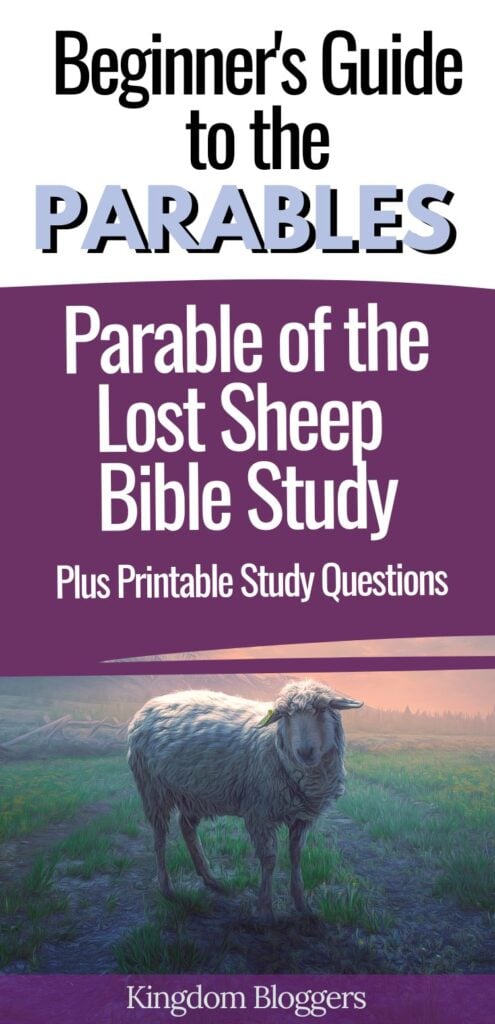The Parable of the Lost Sheep is a powerful illustration found in the Gospels of Matthew and Luke.
This parable teaches us that just as a shepherd willingly leaves his flock to search for one lost sheep, our heavenly Father searches for his lost children.
This parable also shows that the Kingdom of God is accessible to everyone, including those who have wandered away from God.
God wants all of his lost children to be found. He is delighted—and even celebrates—when these children return to his family.
Additionally, through this parable, we see God’s pursuant love for his children. Our heavenly Father is not distant or aloof. He is caring, loving, and tender with us.
Like a good Dad, he pursues his children when they wander away. He is quick to scoop us into his arms and carry us to safety. His mercy and forgiveness have no limits, and everything he does is done in love because he is love.
Matthew and Luke share this story in different contexts, and we can learn different lessons from these two versions of the parable.
Today, we will look at both versions as we explore our need for repentance and God’s desire to grant the gift of eternal life to all of his children.

This post may contain affiliate links. Read our full disclosure here.
Parable of the Lost Sheep Summary
Let’s begin with Matthew’s account of the parable.
In Matthew’s version, Jesus shared the story after being asked, “Who is the greatest in the kingdom of heaven?” (Matthew 18:1, ESV).
Jesus answered the question by declaring that anyone who humbled himself like a little child was the greatest in the kingdom.
He then warned against sinful living and declared:
“See that you do not despise one of these little ones. For I tell you that in heaven their angels always see the face of my Father who is in heaven. What do you think? If a man has a hundred sheep, and one of them has gone astray, does he not leave the ninety-nine on the mountains and go in search of the one that went astray? And if he finds it, truly, I say to you, he rejoices over it more than over the ninety-nine that never went astray” (Matthew 18:10-13).
Through this teaching, Jesus’ disciples were challenged to humble themselves, grow in trust, and broaden their understanding of what it meant to follow Jesus.
Jesus saw that the disciples were boastfully competing with one another, and he was reminding them to be humble. We’ll explore these concepts in greater depth shortly.
First, let’s look at Luke’s version of the parable.
In Luke’s account, Jesus told the Parable of the Lost Sheep at a time when the tax collectors and other sinful people had gathered around him.
Meanwhile, the religious leaders grumbled because they did not approve of Jesus spending time with unholy people.
Jesus responded by sharing three parables: The Parable of the Lost Sheep, the Parable of the Lost Coin, and the Parable of the Prodigal Son.
We will closely examine Luke’s account of the Parable of the Lost Sheep today; however, we will also briefly explore all three parables in Luke 15.
Together, they offer a more complete picture of the lessons illustrated through Jesus’ words.
Below is a summary of Jesus’ response to the religious leaders and teachers of the law when they criticized him for spending time with sinful people.
Jesus began by sharing the Parable of the Lost Sheep.
Here are his words from the gospel of Luke:
“What man of you, having a hundred sheep, if he has lost one of them, does not leave the ninety-nine in the open country, and go after the one that is lost, until he finds it? And when he has found it, he lays it on his shoulders, rejoicing. And when he comes home, he calls together his friends and his neighbors, saying to them, ‘Rejoice with me, for I have found my sheep that was lost.’ Just so, I tell you, there will be more joy in heaven over one sinner who repents than over ninety-nine righteous persons who need no repentance” (Luke 15:4-7).
In the lost sheep parable, Jesus was teaching the religious leaders that just as a shepherd will leave his ninety-nine sheep to find the one that is lost, he will go to great lengths to pursue one lost sinner.
Jesus was showing that the love of God knows no bounds. God pursues the lost. He is the Great Shepherd who will go to extensive measures to find his lost sheep.
After this parable, Jesus offered the Parable of the Lost Coin. In this parable, a woman has lost her coin within her home.
Desperate to find it, she searches the entire house. She sweeps the dirt floors, looks under every surface, and passionately seeks the coin until she finds it.
When she finally finds the lost coin, she rejoices and calls her neighbors to celebrate with her.
This parable is a demonstration of God’s love and the joy he experiences when one sinner repents and returns to his open arms.
Next, Jesus shares the Parable of the Prodigal Son. In this parable, a father has two sons. The younger son asks for his share of his inheritance early.
He then leaves home and spends all of his money on parties and reckless living. When the money runs out, he takes a job caring for pigs.
Eventually, the young man becomes so destitute that he considers eating the pig food. At this point, he decides to return home and seek his father’s forgiveness.
He is not sure how his father will receive him; nevertheless, he takes the risk, humbles himself, and returns to his father’s home.
As the young man walks toward his home, his father sees him from a long way off. The father runs to his son, throws his arms around him, and hugs and kisses him.
With great joy, he declares that it is time to kill the fattened calf and celebrate.
Meanwhile, the older brother watches and is envious. He asks his father why he has never been celebrated lavishly. The father looks at his older son and reminds him that everything he has is shared with him.
This parable shows us God’s posture toward us when we repent and return to him in humility: Like the prodigal father, he throws aside propriety (respectable Jewish men did not run Jesus’ day), runs to us, and wraps his arms around us.
God celebrates every repentant soul who returns to his loving embrace. He is not harsh, cold, or distant. He is a wonderful Father with great love for each of his children.
Together, these three parables teach us a great deal about the kingdom of heaven. We see that the heart of God is filled with great love for his children. He will go to extensive heights to seek and save his lost and wayward children.
God loves us more than we can fathom, and he wants us to build our lives upon his unending love.
Now that we’ve explored the context of both Matthew and Luke’s accounts of this parable, let’s take a closer look at the meaning of the Parable of the Lost Sheep.

Parable of the Lost Sheep Meaning
We can gather a variety of deeper meanings from these two versions of the parable.
First, the parable teaches us that in the kingdom of God, the Son of Man will go to all extremes to find God’s lost and wayward children.
Just as God pursued Adam and Eve in the Garden of Eden after they ate the forbidden fruit, he pursues all of his children.
Perhaps, like Adam and Eve, you feel ashamed because you have turned away from God. Maybe you’ve pursued a sinful lifestyle and walked away from your faith.
If this is the case, you might assume that because you rejected God, he will reject you.
The Parable of the Lost Sheep teaches that even when we reject God by wandering away from him, he pursues us.
The Apostle Paul is an excellent example of God’s pursuit. Before his conversion on the Damascus Road, Paul (formerly named Saul) was a Jewish religious leader who cruelly persecuted Jesus’ followers.
We might expect Jesus to reject Saul. Instead, he pursued him. He appeared to him on the road, spoke to him, touched him with his love, called him into a new ministry, and transformed his life.
Jesus pursues us today, too. He pursues us through Christian friends who encourage us, subtle nudges that stir our hearts to turn toward him, songs that touch our souls, acts of kindness from strangers, and more.
Second, in addition to revealing God’s pursuant love for us, this parable teaches us that God’s ways are different than our ways. We might expect God to turn away from the rebellious lost sheep.
We might expect him to stay with the rest of the flock and let the wayward sheep wander away.
However, the Shepherd left the flock because the single lost sheep was of great value to him.
In the same way, every human being is of great value to the Lord. He is willing to go to great depths and heights to pursue each of us.
Third, the parable shows us a God who willingly carries us.
Have you ever felt too weak to keep walking? Have you ever fallen so far from God that you didn’t know how to pick yourself up and return to the flock?
God wants us all to know that when get ourselves into precarious messes that leave us weak and fragile, he is willing to search until he finds us, and he will carry us until we are strong enough to stand on our own.

Parable of the Lost Sheep Moral Lessons
This parable is also filled with moral lessons that can be applied to our lives. From it, we learn that no one is ever too far lost to be saved by God.
We are also reminded that God cares for those who are different than us, and we should care for them, too.
Additionally, this parable reminds us to walk in humility. Lastly, the parable is an admonition to remain securely rooted in God’s family.
Let’s take a closer look at each of these four moral lessons.
1. No One is Ever Too Far Lost to be Saved by God.
No sheep has wandered so far that the shepherd will not search until he finds it. In the same way, we cannot wander so far away from God that he will not pursue us.
This pursuit unfolds in many different ways. At times, we experience his pursuit through other people. At other times, we sense him speaking to us, guiding us, or softening our hearts.
It’s also important for us to remember that just as we are never too far lost to be saved by God, others are never too far lost. God wants all people to come to saving faith in Christ.
Sometimes, when people who have lived sinful lives receive Jesus, we find it difficult to embrace and receive them as members of God’s family.
Nevertheless, God’s grace is available to all people. No one is too far lost, and God wants us to have open, loving hearts toward all people.
This moral lesson can become a prompt that reminds us to pray for the lost people surrounding us.
Do you have an especially difficult family member or acquaintance who does not know Jesus? Perhaps this person knows how to push all of your buttons and is an expert at getting under your skin.
Instead of grumbling about this person or ruminating over bitter thoughts, start praying for this person.
Pray that this person will sense God’s pursuit. Ask God to soften this person’s heart so that he or she will become receptive to the Gospel.
God wants to bring all people into his family. You can join him in his pursuit by praying for those who don’t know him, even those who ruffle your feathers.
2. We Are to Care for Those Who are Different From Us.
God pursued the sheep outside the fold.
Right now, God is pursuing people who look vastly different from you. They might even be people you resent or look down upon.
God is pursuing the cashier with the crazy hair at the grocery store where you shop. He is pursuing your most aggravating coworker. He is pursuing the man who sits outside your office building and begs for money.
Furthermore, God wants to use you in this pursuit. He is calling you to carry his love into difficult places. He wants to shine his light through you so that troubled souls will be drawn to him.
The next time you go to the grocery store, smile kindly at the clerk, even if this person seems vastly different from you. Offer a compliment. Pray while you swipe your card and fill your cart. God wants you to be his vessel.
The next time your difficult coworker makes a sarcastic comment, extend kindness instead of responding with coldness. Ask God to show you what is happening in your coworker’s heart. Aim to be a vessel of love instead of someone who is easily offended.
When you walk past the man who begs for money on the street corner, offer a kind word. Ask him if he has met Jesus. Share the Gospel. God is pursuing him, and he wants to use you.
3. Jesus Wants Us to Trust Him Freely and Depend on Him Completely.
Our third moral lesson is illustrated through Matthew’s account of the parable. In Matthew’s version, Jesus shared this parable after his disciples were arguing about who was the greatest.
Jesus responded by saying that those who become like little children are the greatest in his kingdom. In other words, Jesus wants us to trust him freely and depend on him completely—in the same way that young children depend upon their parents.
Young children think in simple terms. They trust that their parents will provide what they need each day. Children generally take people at their word without much scrutiny.
In the same way, Jesus calls us to humble trust.
He is calling you to deeper levels of trust right now. Take a moment to examine your life and identify any areas in which trusting the Lord currently feels difficult.
Maybe you’re facing an uncertain diagnosis, or you might be preparing to transition into a new season in your life. You might feel anxious about what is ahead.
These are normal emotions; however, do not be led by your emotions. Jesus is currently inviting you to grow in trust. We grow in trust by walking through situations in which trusting Jesus is difficult.
The Lord is inviting you to become childlike in your faith and trust today. Ask him to help you trust him more. Find a Bible promise to stand on that will help you overcome fearful thoughts.
Every time you feel worried, speak the promise and plant your feet on the firm foundation of God’s Truth.
This is how we grow in trust.

4. God will never leave or forsake us.
Lastly, this parable is an admonition to remain securely rooted in Christ. Jesus knew he could leave the other ninety-nine sheep because they were secure within his fold.
We can rest assured that once we are within the family of God, our Lord will never leave us nor forsake us (see Hebrews 13:5). The illustration of the secure flock is a beautiful illustration of God’s love for us.
Like the older brother in the story of the Prodigal Son, the ninety-nine protected sheep possess everything that belongs to the Father. They are secure and held by him.
In the same way, as we live within God’s family, we are protected and grounded in our relationship with the Lord. We need not fear the future, and God is pleased to bless us with every good gift.
The Parable of the Lost Sheep is a wonderful illustration of God’s great love for us. God knows no bounds and eagerly pursues all who stray from him. He pursues us in many different ways, and his love for us is unending.

Like the shepherd who found his lost sheep, the woman who rediscovered her silver coin, and the father who embraced his prodigal son, God is delighted when we return to him.
He treasures us and cherishes us. He is a Good Father, and his heart overflows with love and tenderness toward us.
Do you sense the Great Shepherd pursuing you today? You might feel too weak to run to him but do not fear. He is ready to reach down, pick you up, and carry you back to safer, higher ground.
He invites you to lean into him and find rest in him.
Related: 38 Parables of Jesus, Bible Verses about Butterflies